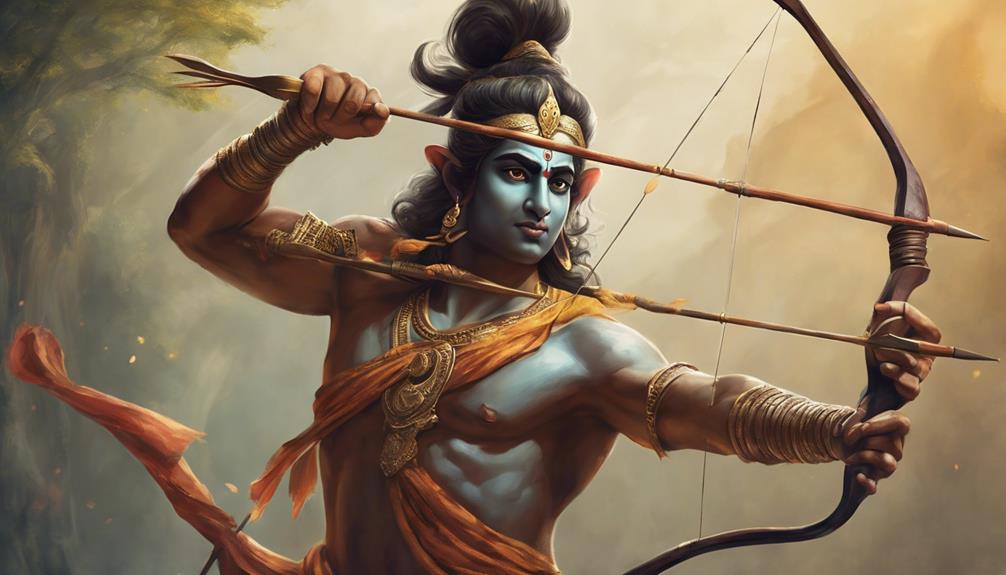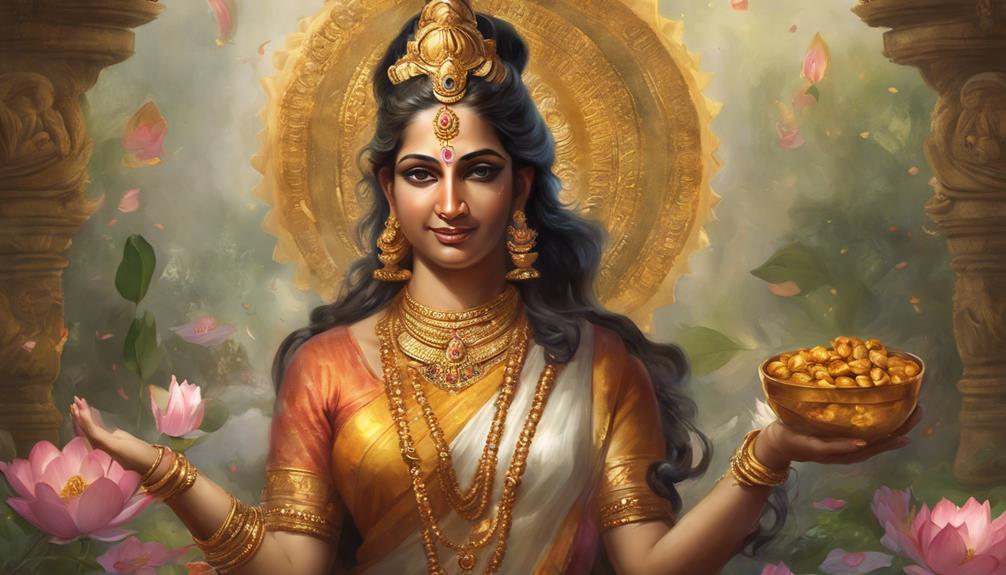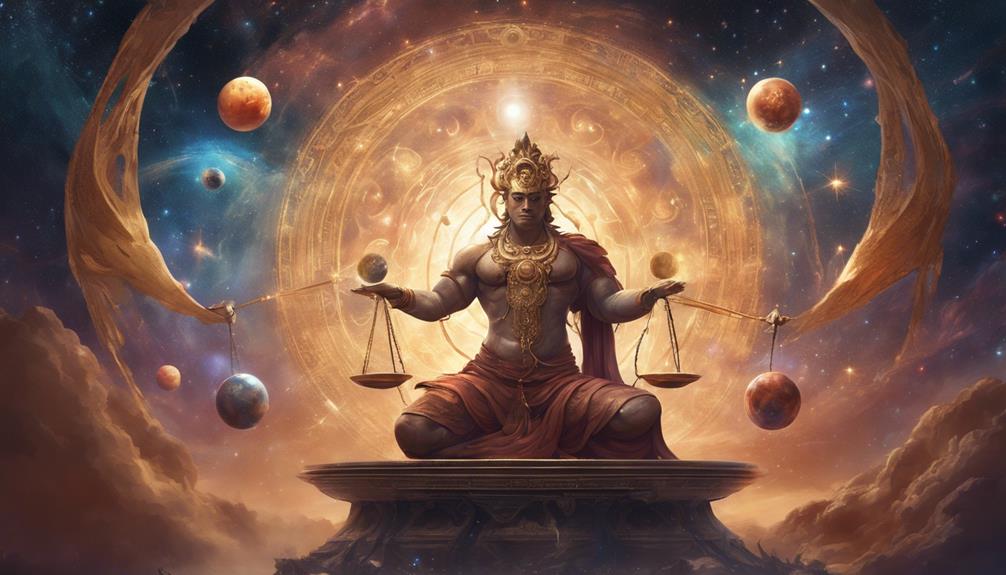In Hindu deities, karma and dharma are intricately woven into their representations. Lord Vishnu epitomizes upholding dharma and the karmic cycle through his actions and avatars, emphasizing the importance of living in harmony with cosmic order. Goddess Kali symbolizes the purification of karma through destruction and facing the consequences of deeds, while Lord Rama teaches essential dharma lessons of righteousness and duty.
Lord Krishna expounds on selfless service and aligning with righteous duty for spiritual growth, and Goddess Lakshmi signifies balancing material wealth with spiritual prosperity in alignment with dharma. The mythological narratives of these deities exemplify the profound influence of karma and dharma in Hindu beliefs, shaping destinies and moral conduct.
Table of Contents
Key Takeaways
- Lord Vishnu embodies dharma for cosmic order and spiritual evolution.
- Goddess Kali purifies karma through destruction for spiritual growth.
- Lord Rama teaches invaluable dharma lessons through his actions.
- Lord Krishna expounds Karma Yoga for spiritual growth in the Bhagavad Gita.
- Goddess Lakshmi symbolizes wealth in alignment with dharma for spiritual prosperity.
Karma and Dharma in Lord Vishnu
What role do karma and dharma play in the divine actions of Lord Vishnu? Understanding this question explores the essence of Vishnu's teachings and the profound implications of karma philosophy within Hinduism. Lord Vishnu, the preserver in the Hindu trinity, embodies the principles of dharma and karma through various mythological narratives and philosophical discourses.
Vishnu's teachings emphasize the importance of upholding dharma, or righteousness, in one's actions. He's often depicted as the one who maintains cosmic order by ensuring that individuals adhere to their prescribed duties and moral responsibilities. Through his divine interventions, Vishnu teaches the significance of living a life in harmony with dharma, which ultimately leads to spiritual evolution and liberation.
Furthermore, karma philosophy is intricately intertwined with Vishnu's actions and interventions in the world. The concept of karma, the law of cause and effect, underscores that every action has corresponding consequences, whether immediate or delayed. Vishnu, being the sustainer of the universe, enacts his divine will in alignment with the principles of karma, ensuring that cosmic justice prevails. His incarnations, known as avatars, exemplify the karmic cycle and the idea that individuals must face the outcomes of their actions, whether positive or negative, in accordance with the eternal laws of the universe. In the grand tapestry of Vishnu's divine actions, karma and dharma serve as guiding principles that shape the destinies of gods and mortals alike.
The Role of Karma in Goddess Kali
In exploring the divine manifestations of Goddess Kali, the intricate relationship between her actions and the profound concept of karma comes to light with compelling depth and significance. Goddess Kali, often depicted as a fierce warrior goddess, embodies the concept of karma in a unique manner. Her role in Hindu mythology is closely linked to the purification of karma through her destructive nature. Kali's fierce form represents the necessary destruction of negative karma to pave the way for new beginnings and spiritual growth. By annihilating demons and evil forces, she upholds the cosmic order and guarantees that dharma prevails over adharma.
Goddess Kali's association with karma purification serves as a powerful reminder of the consequences of one's actions. Her fearsome appearance and destructive prowess symbolize the relentless pursuit of righteousness and the eradication of ignorance. Through her deeds, Kali demonstrates the inevitability of facing the outcomes of one's karma, emphasizing the importance of upholding dharma and the continuous cycle of creation and destruction in the cosmic domain.
Dharma Lessons From Lord Rama

From the epic Ramayana emerges a profound narrative that encapsulates invaluable dharma lessons through the exemplary life of Lord Rama. Rama's righteousness and adherence to dharma teachings serve as a beacon for individuals seeking guidance on moral conduct and duty. His unwavering commitment to upholding righteousness, even in the face of adversity, imparts timeless lessons on duty and honor.
Throughout Rama's story, one can glean essential principles of dharma, emphasizing the importance of fulfilling one's responsibilities with utmost sincerity and dedication. Rama's unwavering loyalty to his father's words, his respect for elders, and his compassion towards all beings showcase the qualities of a true Dharmic leader.
Karma Yoga in Lord Krishnas Teachings
Lord Krishna's teachings intricately expound the profound philosophy of Karma Yoga, elucidating the path of selfless action and spiritual fulfillment. In the Bhagavad Gita, Lord Krishna emphasizes the importance of selfless service as a means to spiritual growth. He teaches that one should perform their duty without attachment to the fruits of their actions, focusing instead on the act itself. By engaging in selfless service, individuals can purify their hearts and minds, ultimately leading them toward enlightenment.
Lord Krishna highlights the significance of duty in one's life, emphasizing that every individual has a specific role to fulfill in the cosmic order. Through the practice of Karma Yoga, individuals can align themselves with their dharma, or righteous duty, leading to a deeper understanding of their place in the universe. By performing actions selflessly and without selfish motives, individuals can progress on the path toward spiritual growth and realization of the true self. Lord Krishna's teachings on Karma Yoga serve as a guiding light for those seeking to lead a life of purpose, service, and enlightenment.
Dharma in the Stories of Goddess Lakshmi

Goddess Lakshmi's stories provide insight into her divine duties and the symbolism of wealth in Hindu mythology.
Understanding the concept of Dharma in these narratives offers a glimpse into the principles of righteousness and duty that govern her actions.
Exploring how Lakshmi upholds Dharma sheds light on the values associated with wealth and prosperity in Hindu belief systems.
Lakshmis Divine Duties
In the stories portraying Goddess Lakshmi, her divine duties exemplify the intricate balance between spiritual principles and material wealth. Lakshmi's blessings are often depicted as a symbol of divine abundance, representing not just physical riches but also spiritual prosperity.
As the Goddess of wealth and prosperity, she's responsible for bestowing blessings upon her devotees, ensuring their well-being and success. Through her divine duties, Lakshmi teaches the importance of using material wealth for the greater good and promoting spiritual growth.
Her role goes beyond mere accumulation of riches; it encompasses the idea of using wealth in alignment with dharma, reinforcing the concept of karma and the interconnectedness of actions and consequences in the cosmic balance of the universe.
Symbolism of Wealth
The symbolism of wealth in the stories of Goddess Lakshmi underscores the profound connection between material prosperity and spiritual principles. Goddess Lakshmi is the epitome of symbolic abundance and prosperity in Hindu mythology. As the consort of Lord Vishnu, she represents wealth in its purest form, signifying not only material riches but also spiritual wealth.
Lakshmi's presence in the stories highlights the significance of wealth representation, emphasizing that true prosperity encompasses both material and spiritual well-being. Through her association with wealth, Lakshmi teaches the importance of generosity, gratitude, and ethical conduct in attaining and maintaining abundance. Her depiction in Hindu scriptures serves as a reminder that wealth, when acquired and utilized with righteousness, can lead to spiritual fulfillment and harmony in life.
Karma Phala: Results of Actions
When considering the concept of Karma Phala, it's essential to understand the fundamental principles of cause and effect.
Karma Phala explores the moral consequences of one's actions, highlighting the interconnectedness between deeds and their outcomes.
This intricate web of cause and effect underscores the significance of acting with mindfulness and ethical awareness in Hindu beliefs.
Cause and Effect
Through the intricate workings of karma, every action initiated by an individual sets into motion a chain of events that culminate in consequences known as Karma Phala, embodying the results of those actions.
In Hindu philosophy, the concept of karma emphasizes the idea that one's actions, whether good or bad, will inevitably shape their future experiences. This intertwines with the principles of Dharma, which guide individuals to endeavor morally and ethically in alignment with their duty or righteous path.
Understanding the cause and effect nature of karma allows individuals to comprehend the direct relationship between their deeds and the outcomes they face. By recognizing this relationship, one can aspire to cultivate positive karma through virtuous actions, ultimately leading to a more harmonious and fulfilling life.
Moral Consequences
Initiating a discussion on Moral Consequences, explore the intricate web of Karma Phala to uncover the profound impact of actions on one's destiny within Hindu beliefs.
In Hinduism, the concept of Karma Phala emphasizes that every action, good or bad, has consequences that shape one's future experiences. The law of karma dictates that virtuous deeds (dharma virtues) lead to positive outcomes, while negative actions result in unfavorable karma consequences.
Accordingly, adhering to one's dharma and performing righteous actions is believed to generate positive karma, leading to a more fulfilling and harmonious existence. Conversely, straying from one's dharma and engaging in unethical behavior can bring about undesirable consequences that may manifest in this life or the next, underscoring the significance of moral responsibility in Hindu philosophy.
Dharma Sustains the Universe

Dharma, the principle of moral order and duty in Hindu belief systems, plays a crucial role in sustaining the universe. It's through dharma that cosmic balance and universal order are maintained according to Hindu beliefs. Dharma acts as the guiding force that upholds righteousness, ethics, and duty in the world. In Hindu cosmology, the universe functions harmoniously when individuals adhere to their dharma, fulfilling their responsibilities and obligations within society.
The concept of dharma sustaining the universe is deeply rooted in the belief that every action has consequences and that following one's dharma is essential for both personal growth and the well-being of the world. When individuals act in accordance with their dharma, they contribute positively to the cosmic order, ensuring the smooth operation of the universe. Conversely, neglecting one's dharma can lead to imbalance, chaos, and disruption in the fabric of existence.
In essence, dharma serves as the cornerstone of Hindu philosophy, providing a moral compass for individuals and societies to navigate life in alignment with the greater cosmic harmony. Through the practice of dharma, the universe remains in a state of equilibrium, reflecting the interconnectedness of all beings and the significance of upholding one's ethical duties.
Frequently Asked Questions
How Do the Concepts of Karma and Dharma Differ in Hindu Mythology Compared to Their Modern Interpretations?
In Hindu mythology, the concepts of karma and dharma are deeply rooted in ancient interpretations. They differ from modern views due to cultural significance. Understanding these distinctions helps dispel misconceptions and highlights their contemporary relevance.
Are There Any Hindu Deities That Prioritize Dharma Over Karma in Their Teachings?
In Hindu mythology, some deities like Lord Rama and Lord Krishna are considered dharma-centered. They prioritize duty and moral teachings over karma, emphasizing religious obligations. These deities symbolize the importance of upholding righteousness and ethical conduct.
How Do the Stories of Hindu Deities Reflect the Interplay Between Individual Actions and Cosmic Order?
In Hindu mythology, stories of deities exemplify the intricate relationship between personal actions and cosmic balance. These tales emphasize moral responsibility, illustrating how individual deeds influence divine justice and contribute to the overarching order of the universe.
Are There Any Specific Rituals or Practices Associated With Karma and Dharma in Hindu Worship?
In Hindu worship, ritual practices hold significant importance in honoring karma and dharma. Symbolic representations and offerings during ceremonies reflect the adherence to these principles, guiding individuals to align their actions with cosmic order for spiritual growth.
How Do the Concepts of Karma and Dharma Influence the Relationships Between Humans and Deities in Hindu Mythology?
In Hindu mythology, the relationships between humans and deities are shaped by karma and dharma. Deity worship reflects adherence to moral duties, reinforcing the interconnectedness of actions and consequences in the cosmic balance of cause and effect.
Conclusion
In Hindu mythology, the concepts of karma and dharma are intricately woven into the representations of various deities. From Lord Vishnu exemplifying the importance of upholding dharma to Goddess Kali embodying the consequences of karma, each deity serves as a powerful reminder of the interconnectedness of actions and their outcomes.
Through their stories and teachings, these divine figures showcase the eternal principles of karma and dharma that sustain the universe and guide humanity towards spiritual fulfillment.